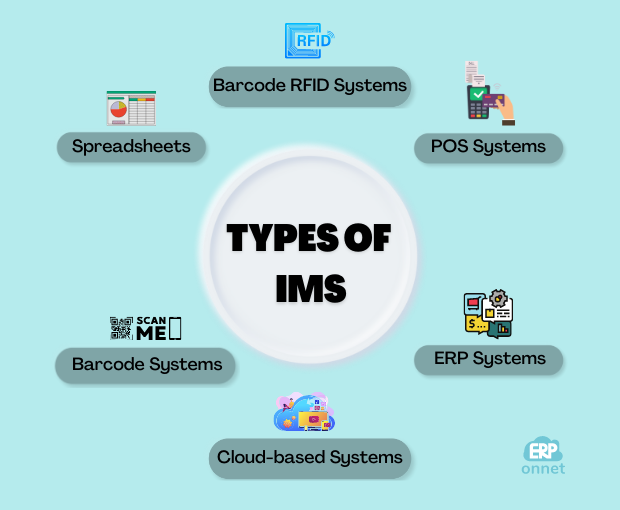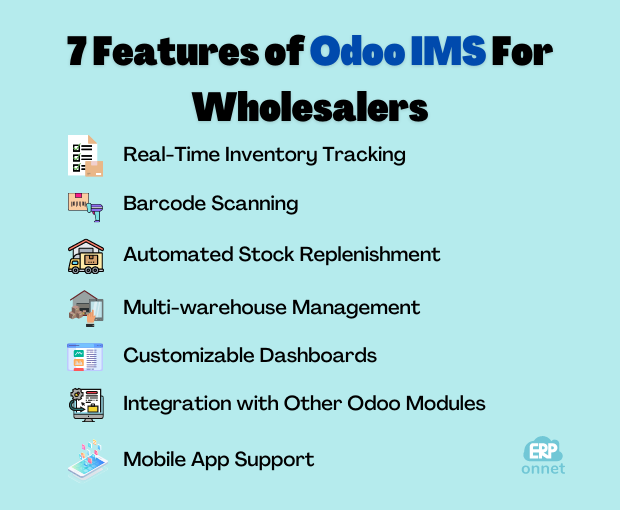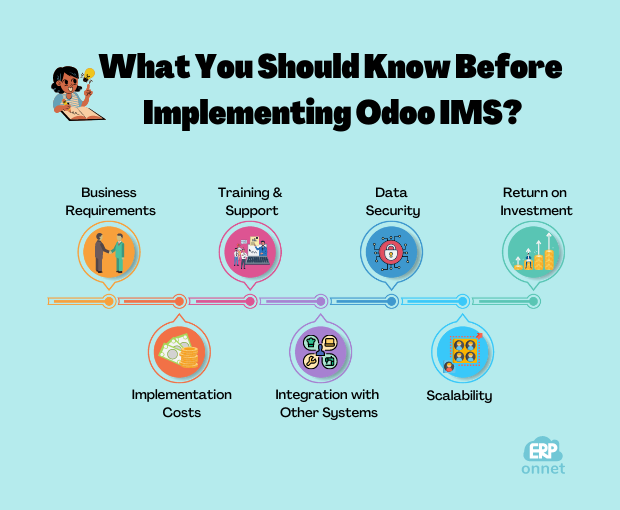Odoo Inventory: Inventory Management System for Malaysian Wholesalers
Inventory management is a crucial aspect of every business, especially for wholesalers who deal with a large volume of goods. Managing inventory can be overwhelming, time-consuming, and challenging, especially for businesses that operate manually. Fortunately, with the advancement in technology, businesses can now leverage inventory management systems to streamline their operations and stay ahead of the competition.
In this blog post, we will explore the following topics:
The concept of inventory management system
Types of inventory
Types of inventory management system,
Why Malaysian wholesalers need an inventory management system
Odoo inventory management system features for wholesalers
What you should know before implementing Odoo inventory management system
What is Inventory Management System?
An inventory management system is a software solution designed to help businesses manage inventory levels, orders, sales, and deliveries. The system allows businesses to track their inventory levels in real time, automate manual processes, and optimize inventory control. With an inventory management system, businesses can make informed decisions about inventory restocking, reduce stock-outs, and minimize inventory holding costs.
Inventory management systems are widely used across different industries, including retail, manufacturing, healthcare, and wholesale. The systems offer several benefits, such as increased efficiency, accuracy, and cost savings.
Types of Inventory
Before diving into the types of inventory management systems, it's crucial to understand the different types of inventory that businesses deal with. The following are the main types of inventory:
Raw Materials Inventory
Work-In-Progress Inventory
Finished Goods Inventory
Maintenance, Repair, and Operating (MRO) Inventory
Raw Materials Inventory
Raw materials inventory refers to the materials that businesses use to manufacture their products. For example, a textile company will have raw materials such as cotton, wool, or silk in its inventory.
-
Work-In-Progress Inventory
Work-in-progress inventory is the inventory that is currently in production. For example, a car manufacturer will have work-in-progress inventory in the form of unfinished cars.
-
Finished Goods Inventory
Finished goods inventory is the final product that is ready to be sold to customers. For example, a smartphone manufacturer will have finished goods inventory in the form of fully assembled smartphones.
-
Maintenance, Repair, and Operating (MRO) Inventory
MRO inventory consists of items that businesses use to keep their operations running smoothly. For example, a construction company will have MRO inventory in the form of tools, equipment, and spare parts.
Types of Inventory Management Systems
There are several types of inventory management systems available in the market. The following are the main types:

Spreadsheets
Point of Sale (POS) Systems
Barcode Systems
Radio Frequency Identification (RFID) Systems
Cloud-based Systems
Enterprise Resource Planning (ERP) Systems
Spreadsheets
Spreadsheets are a simple and low-cost way of managing inventory. However, they are prone to errors, lack real-time updates, and require manual data entry.
Point of Sale (POS) Systems
POS systems with inventory management are used to manage inventory in retail businesses. The systems are integrated with the cash register and track sales and inventory in real time.
Barcode Systems
Barcode systems use barcode scanners to track inventory. The systems are efficient, accurate, and reduce the likelihood of errors.
Radio Frequency Identification (RFID) Systems
RFID systems use radio waves to track inventory. The systems are efficient, accurate, and provide real-time updates.
-
Cloud-based Systems
Cloud-based systems are hosted on remote servers and accessed via the internet. The systems offer real-time updates, remote access, and scalability.
-
Enterprise Resource Planning (ERP) Systems
ERP systems integrate inventory management with other business functions, such as finance, accounting, and customer management. The systems offer real-time updates, automation, and scalability.
Why Malaysian Wholesalers Need An Inventory Management System
Malaysian wholesalers face several challenges when managing their inventory, such as managing large volumes of goods, dealing with multiple suppliers, and meeting customer demands. Without an inventory management system, businesses may face stock-outs, overstocking, and inaccurate inventory data, which can lead to lost sales, increased holding costs, and reduced profitability.
Here are some reasons why Malaysian wholesalers need an inventory management system:
Improved Inventory Accuracy
Increased Efficiency
Better Customer Service
Reduced Holding Costs
Increased Profitability
Improved Inventory Accuracy
An inventory management system can help Malaysian wholesalers improve inventory accuracy by providing real-time updates on stock levels, orders, and deliveries. With accurate inventory data, businesses can make informed decisions about inventory restocking, reduce stock-outs, and avoid overstocking.
Increased Efficiency
An inventory management system can automate manual processes, such as data entry, order processing, and reporting. With automation, businesses can save time, reduce errors, and increase efficiency.
Better Customer Service
An inventory management system can help Malaysian wholesalers provide better customer service by ensuring that the right products are available at the right time. With real-time updates on inventory levels, businesses can fulfill customer orders quickly, reduce lead times, and improve customer satisfaction.
Reduced Holding Costs
An inventory management system can help Malaysian wholesalers reduce holding costs by optimizing inventory levels. With real-time updates on inventory data, businesses can avoid overstocking, reduce waste, and minimize storage costs.
-
Increased Profitability
An inventory management system can help Malaysian wholesalers increase profitability by reducing operational costs, improving efficiency, and providing better customer service. With better inventory control, businesses can optimize inventory levels, reduce stock-outs, and avoid overstocking, which can lead to increased sales and profitability.
7 Features of Odoo Inventory Management System for Wholesalers
Odoo is a powerful and flexible inventory management system that is suitable for businesses of all sizes. The system offers several features that can help Malaysian wholesalers streamline their operations and improve inventory control.

Here are seven features of Odoo inventory management system for wholesalers:
Real-Time Inventory Tracking
Barcode Scanning
Automated Stock Replenishment
Multi-Warehouse Management
Customizable Dashboards
Integration with Other Odoo Modules
Mobile App Support
Real-Time Inventory Tracking
Odoo inventory management system provides real-time updates on inventory levels, orders, and deliveries. With real-time tracking, businesses can make informed decisions about inventory restocking, reduce stock-outs, and avoid overstocking.
-
Barcode Scanning
Odoo inventory management system supports barcode scanning, which can help businesses track inventory accurately and efficiently. With barcode scanning, businesses can reduce errors, improve efficiency, and provide real-time updates on inventory data.
-
Automated Stock Replenishment
Odoo inventory management system can automate stock replenishment based on predefined rules and thresholds. With automation, businesses can reduce manual intervention, save time, and avoid stock-outs.
-
Multi-Warehouse Management
Odoo inventory management system supports multi-warehouse management, which can help businesses manage inventory across multiple locations. With multi-warehouse management, businesses can optimize inventory levels, reduce lead times, and improve customer service.
-
Customizable Dashboards
Odoo inventory management system provides customizable dashboards that allow businesses to view inventory data in real-time. With customizable dashboards, businesses can monitor inventory levels, orders, and deliveries, and make informed decisions about inventory control.
-
Integration with Other Odoo Modules
Odoo inventory management system integrates seamlessly with other Odoo modules, such as sales, purchase, and accounting. With integration, businesses can automate business processes, improve efficiency, and provide real-time updates on inventory data.
-
Mobile App Support
Odoo inventory management system provides mobile app support, which allows businesses to access inventory data from anywhere, at any time. With mobile app support, businesses can monitor inventory levels, orders, and deliveries on the go, and make informed decisions about inventory control.
What You Should Know Before Implementing Odoo Inventory Management System
Before implementing Odoo inventory management system, there are several factors that Malaysian wholesalers should consider.

Here are some things you should know:
Business Requirements
Implementation Costs
Training and Support
Integration with Other Systems
Data Security
Scalability
Return on Investment
Business Requirements
Malaysian wholesalers should assess their business requirements before implementing Odoo inventory management system. This includes factors such as the size of the business, the complexity of the supply chain, and the types of products being sold. It is important to choose an inventory management system that meets the specific needs of the business.
Implementation Costs
Malaysian wholesalers should consider the implementation costs of Odoo inventory management system, including software licenses, hardware requirements, and implementation fees. It is important to create a budget for implementation and ensure that the costs are justified by the benefits of the system.
Training and Support
Malaysian wholesalers should ensure that they receive adequate training and support when implementing Odoo inventory management system. This includes training for employees on how to use the system, as well as ongoing support from the vendor.
Integration with Other Systems
Malaysian wholesalers should consider how Odoo inventory management system will integrate with other systems, such as accounting software, e-commerce platforms, and shipping providers. It is important to ensure that the system can be integrated seamlessly with existing systems to avoid disruptions in business operations.
Data Security
Malaysian wholesalers should ensure that data security measures are in place when implementing Odoo inventory management system. This includes measures such as data encryption, access controls, and regular data backups to prevent data loss or theft.
Scalability
Malaysian wholesalers should consider the scalability of Odoo inventory management system. The system should be able to grow and adapt as the business grows and expands into new markets.
Return on Investment
Malaysian wholesalers should assess the potential return on investment (ROI) of implementing Odoo inventory management system. This includes factors such as increased efficiency, reduced holding costs, and improved customer service, which can lead to increased sales and profitability.
In conclusion, an inventory management system is essential for Malaysian wholesalers to optimize their inventory levels, reduce operational costs, and improve customer service.
Odoo inventory management system offers several features that can help businesses achieve these goals, including real-time inventory tracking, barcode and RFID scanning, automated stock replenishment, and customizable dashboards.
However, before implementing Odoo inventory management system, Malaysian wholesalers should consider factors such as business requirements, implementation costs, training and support, integration with other systems, data security, scalability, and ROI.
With careful planning and implementation, Odoo inventory management system can help Malaysian wholesalers achieve their business objectives and stay competitive in today's market.

